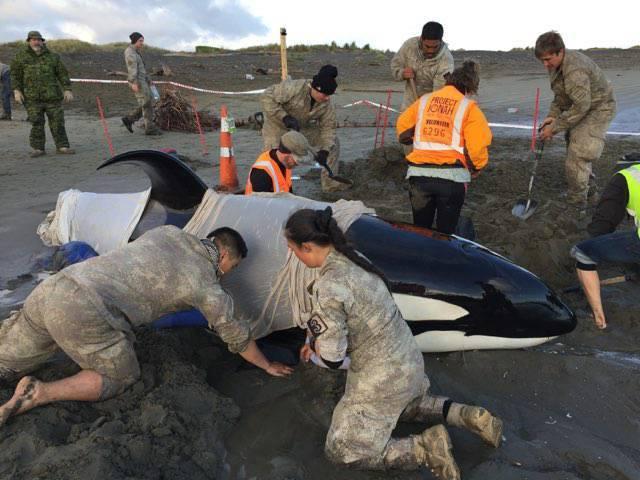
Sea state
The US Navy is conducting exercises in the Sea of Japan with three aircraft carrier groups. The US Ships Theodore Roosevelt, Nimitz and Ronald Reagan are participating in the drills, which began on Saturday and will conclude today. The carrier groups were joined by warships from the South Korean Navy and the Japanese Maritime Self-Defence Force. The exercises coincided with President Donald Trump’s first tour of East Asia and are a significant show of force in the region.
China has reportedly developed a new integrated propulsion system similar to the US electromagnetic aircraft launch system (EMALS). The EMALS is preferable to other ship-borne launch systems for its precision, efficiency and ability to launch heavier aircraft. But the system had been restricted to use on nuclear-powered ships because of its power requirements. This development would allow China’s third aircraft carrier to carry a more effective air group.
Japan launched a new Soryu-class diesel-electric attack submarine last week. Built by Kawasaki Heavy Industries, the 4,200-ton (submerged) sub has an estimated range of 6,100 nautical miles and is expected to enter service in 2019.
Flight path
Several sizeable deals have been struck at the beginning of the 2017 Dubai Airshow. Emirates has placed an order for 40 Boeing 787-10 Jetliners costing US$15.1 billion. The UAE also announced a deal with Lockheed Martin to upgrade its F-16E/F Block 60 fighters at the cost of US$1.6 billion. This year’s exhibition is the largest since the show’s inception in 1989, and almost DH$70 billion (US$24.9 billion) worth of orders were placed on the first day.
The Russian Air Force launched a series of air strikes on Idlib, Aleppo and Hama last week, targeting areas along the Euphrates River. The Syrian Observatory for Human Rights is reporting that 50 civilians have been killed by aerial bombardment or artillery fire since Friday night. Al Jazeera has released a video detailing the effects of the air raids on civilians fleeing to the countryside.
A technical malfunction of an Iraqi Mi-17 helicopter resulted in a horror crash on Sunday, killing all on board. Reuters reports that seven people died in the accident.
Rapid fire
On Remembrance Day, thousands of people across the world pause to honour the lives lost in the line of duty. That former enemies can now commemorate side by side is shown by this clip from the British Army. Meanwhile, some Mexican veterans who served in the US forces, but were later deported, used Sunday’s Veterans Day to take to the streets in Ciudad Juarez.
The UK’s Channel 4 recently aired a documentary that looks at Chinese workers who supported British and French armies during World War I. ‘Britain’s Forgotten Army’ tells the story of the 140,000-strong Chinese Labour Corps, which supported the allied war efforts by building ‘roads and trench systems, repairing railways, maintaining tanks and even dismantling unexploded bombs’ in France and the UK. The makers of the documentary observe that the efforts of Chinese workers have been overlooked for too long.
While taking part in the biennial Southern Katipo 15 Exercise in New Zealand, the New Zealand Army came to the rescue of a stranded orca at Marfells Beach on Monday morning. The soldiers supported the successful efforts to refloat the animal by digging a trench to the sea, working alongside volunteers and experts from the Department of Conversation and Project Jonah.
Zero gravity
Last Wednesday, congressional negotiators rejected a proposal to create a US space corps. Advocates of the change argued that space is becoming increasingly important, and that a space corps would ‘future proof’ the military. Their sights may have been set too far into the future, as the plan was strongly rebuffed by many senior figures, including Defense Secretary Jim Mattis.
US Air Force lieutenant general Steve Kwast has sounded the alarm about China’s strategic focus on space technologies. He stated in an interview with CNBC that, in his ‘best military judgement’, China is currently advancing five times faster than the United States. Kwast recommended deregulation of the space industry, following Space X COO Gwynne Shotwell’s similar statements at the National Space Council meeting in October.
The Planetary Society, a non-profit NGO that advocates for scientific causes related to space, released a blog post detailing their experiences during a recent trip to Australia. Planetary Society CEO Bill Nye travelled to the outback of Australia and toured sacred outback sites with scientists and Aboriginal elders.
Wired watchtower
Facebook has unveiled a joint program with the Australian eSafety Commissioner’s Office to censor ‘revenge porn’. The program will rely on users submitting the images they’d like blocked. Those images will then be hashed and discarded, and the resulting non-sensitive hash will be used to find other copies of the objectionable image as they’re uploaded. However, the nominated photos will first be reviewed by an employee to make sure innocuous images aren’t censored, an oversight mechanism that has been the target of some criticism.
In the US, Congress hauled ex-Yahoo and ex-Equifax execs Marissa Mayer and Richard Smith onto the stand to chastise them about their golden parachutes and their companies’ data breaches. The US government’s Office of Personnel Management has also been criticised for failing to provide personnel and documents for its annual information security audit. The office has cited ‘audit fatigue’ as a reason for its failure to pass what’s been described as an ‘open-book test’.
Lastly, an interesting retrospective examines how the US National Institute for Standards and Technology evolved from the Commerce Department’s coordination response for firefighting to become a global standards-setter and gatekeeper when it comes to cybersecurity and the digital economy.